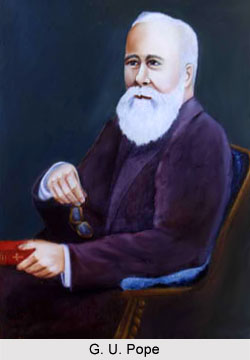 G. U. Pope, also known as Rev. G.U. Pope or George Uglow Pope, was a Tamil Christian poet and a Christian missionary who lived from the year 1820 to 1908. He came to Tamil Nadu in order to preach and propagate the ideals of Christianity. G. U. Pope or George Uglow Pope is still popular in the Tamil country even now due to his contributions to Tamil literature and Tamil language. He was also amongst the eminent pioneers who evolved and developed Tamil Christian Literature. The Tamil Christian author translated several Tamil literary works into English. Some of his most prominent works includes the translations of Tiruvachagam (Tiruvacakam) and Tirukkural. Due to his reputation as an eminent scholar, G. U. Pope was awarded a gold medal by the Royal Asiatic Society. He was also appointed as the head of the Bishop Cotton Boys School, in Bangalore (now Bengaluru) before he went back to Oxford.
G. U. Pope, also known as Rev. G.U. Pope or George Uglow Pope, was a Tamil Christian poet and a Christian missionary who lived from the year 1820 to 1908. He came to Tamil Nadu in order to preach and propagate the ideals of Christianity. G. U. Pope or George Uglow Pope is still popular in the Tamil country even now due to his contributions to Tamil literature and Tamil language. He was also amongst the eminent pioneers who evolved and developed Tamil Christian Literature. The Tamil Christian author translated several Tamil literary works into English. Some of his most prominent works includes the translations of Tiruvachagam (Tiruvacakam) and Tirukkural. Due to his reputation as an eminent scholar, G. U. Pope was awarded a gold medal by the Royal Asiatic Society. He was also appointed as the head of the Bishop Cotton Boys School, in Bangalore (now Bengaluru) before he went back to Oxford.
Early Life of G. U. Pope
G. U. Pope was born on April 24th, in the year 1820, in Prince Edward Island in Canada. His family migrated to England when he was an infant. Pope eventually left for South India in 1839 and arrived at Sawyerpuram, which is located near Tuticorin. George Uglow Pope then became a scholar of Sanskrit, Tamil and Telugu. He established various schools in the Tamil country and taught Philosophy, Mathematics, Hebrew, Latin and English.
Literary Works of G. U. Pope
G. U. Pope finished the translation of Tirukkural in the month of September 1886. His version of the Kural consists of introduction, notes, translation, grammar, concordance and lexicon. The work also contains the Latin Translation of Constanzo Beschi and the English translation of F. W. Ellis with four hundred and thirty six pages. By February 1893, G. U. Pope translated Naaladiyaar (Nalatiyar) which was an ethical work of didactic nature that contains various moral and ethical codes in verses of four lines, four hundred in number in forty chapters, each by a Jain ascetic, according to a Tamil tradition. The translation of Tiruvacakam, was his artistic masterpiece which appeared around the year 1900.
Some of the other works written and published by G. U. Pope includes, First lessons in Tamil (a full introduction to the common dialect of that language); A Tamil hand-book (full introduction to the common dialect of that language); A larger grammar of the Tamil language in both its dialects; A text-book of Indian history; St. John in the Desert (an introduction and notes to Browning`s death in the desert); The Tiruvacakam (Sacred utterances of the Tamil poet, saint, and sage Manickavasagar); A catalogue of the Tamil books in the library of the British Museum and others.
G. U. Pope, also known as George Uglow Pope, was awarded the much desirable Gold Medal of the Royal Asiatic Society in 1906. The eminent Christian poet delivered his last sermon in May 1907 and later died on February 12th 1908.













